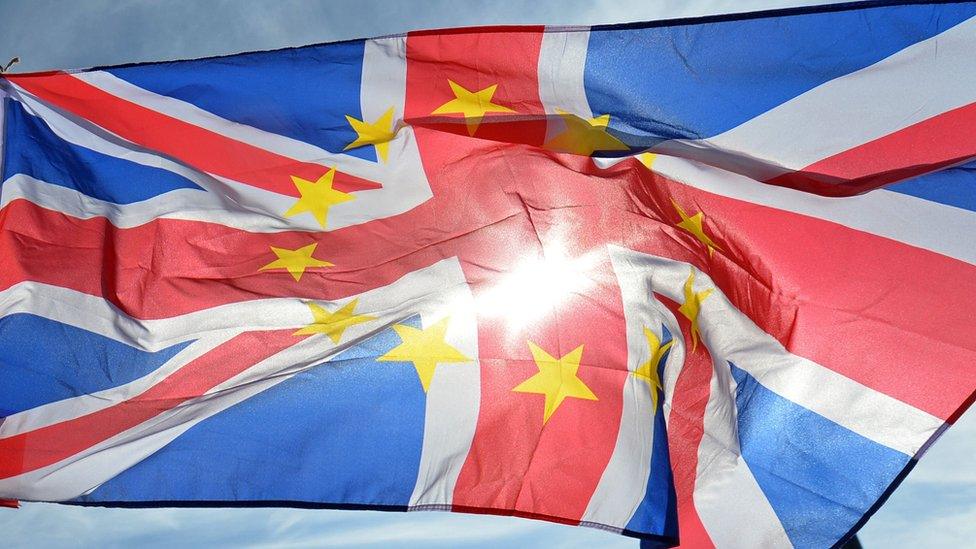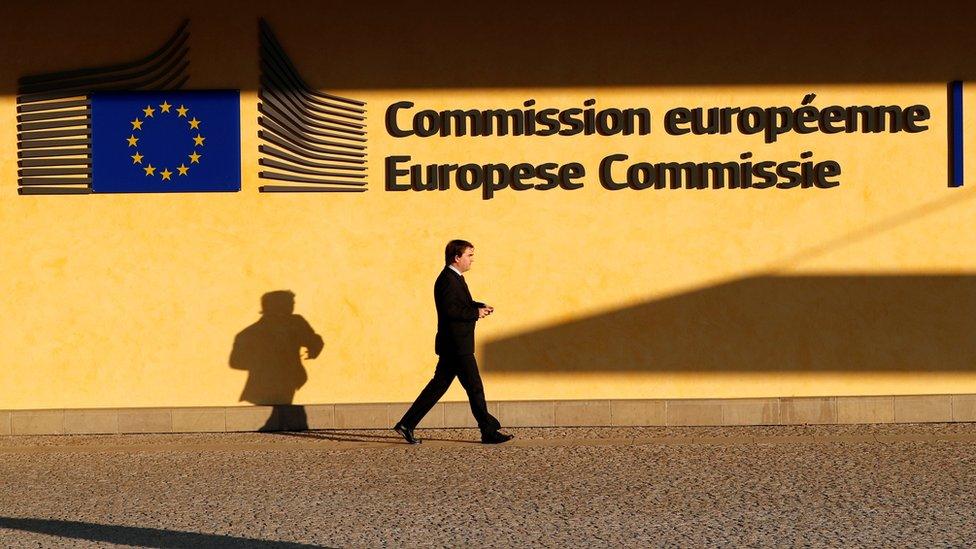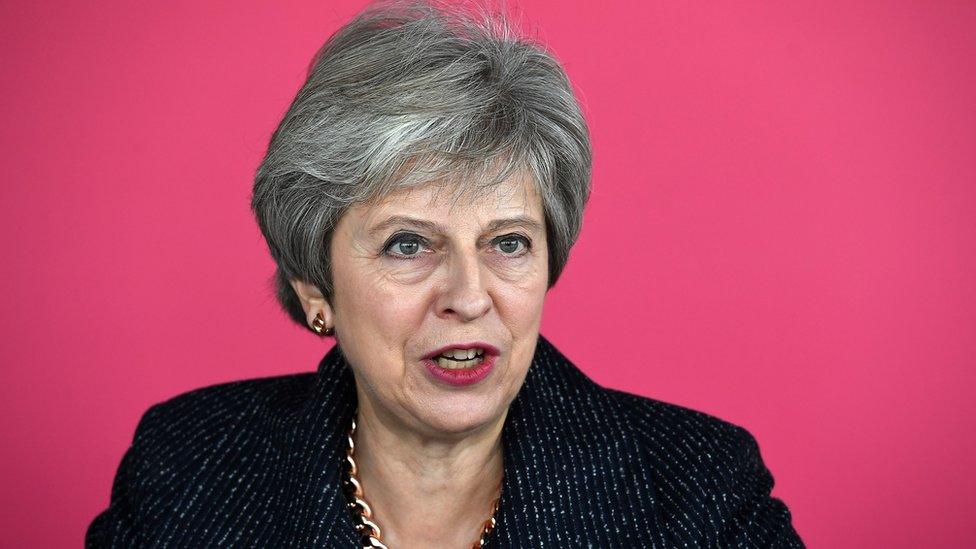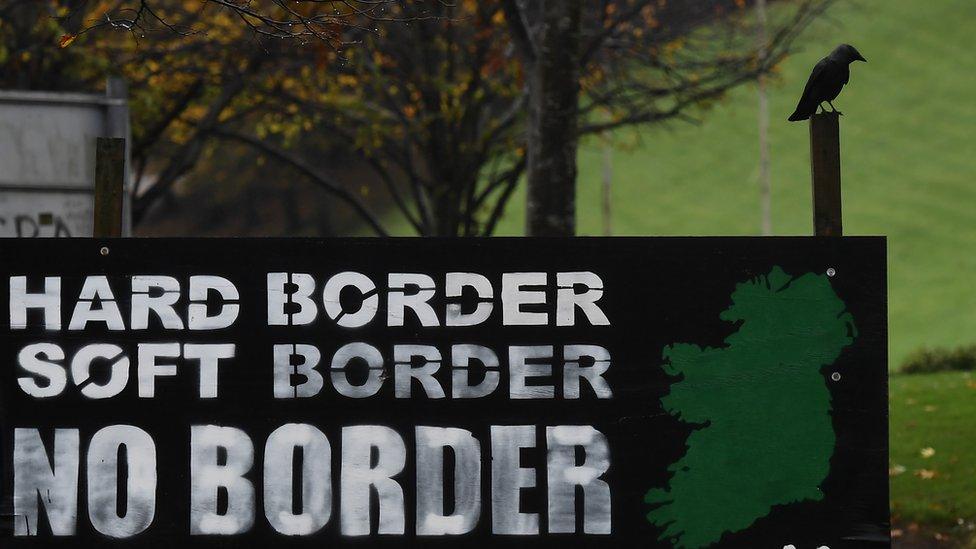Brexit deadline spin: Frenzy in UK, secrecy in Brussels
- Published

"There's a deal on Ireland!", "The whole Brexit agreement will be done by Monday!", "The UK will stay in the customs union forever/until 2020/um, until there is a perfect post-Brexit trading relationship in place..."
All of a sudden, we are drowning in rumour and assertion, whirl and swirl about secret deals being cooked up between the EU and the UK ahead of another crunch EU leaders summit next week.
There is a rush to be the first to splash news of a breakthrough - first and foremost on the fraught issue of the Irish border.
But all the noise right now is coming from UK media outlets.
Reactions, objections and cries of betrayal are being voiced by UK politicians. And therein lies the clue to making our way through this maelstrom.
What we are witnessing here - as we have seen throughout much of this Brexit process, whether the debate has been about the "Brexit bill", staying in the European single market or customs union and even the pros and cons of Brexit itself - is the UK in spasms, arguing with itself about the compromises it can or can't make to seal a deal with Brussels.
UK cabinet minister Esther McVey won't say if she backs PM's EU trade plan
The current UK excitement centres on the details the prime minister will agree to in the EU-required, legally binding guarantee that there will be no hard (customs) border for Northern Ireland, whatever kind of economic relationship the EU and UK end up with after Brexit.
And the counter-noise from Brussels and in the European press?
None.
European consumers of news are not interested in political contortions over Brexit. They want to know if and when a deal is done.
'Tunnel' talks
In Brussels, meanwhile, negotiators have shut themselves in what they describe as a tunnel as technical talks between the EU and UK intensify ahead of next week's EU summit.
Their plan: to emerge bleary-eyed at the end of the weekend, claiming significant progress in the outstanding issues remaining in the withdrawal agreement otherwise known as the divorce deal.

Negotiators are locked in talks in Brussels
Such as what happens post-Brexit to Gibraltar and to the UK's military bases on Cyprus; also agreeing the extent of the European Court of Justice's role in policing the EU-UK divorce terms and, of course, finalising the fiendishly controversial wording of the Irish backstop - that legal guarantee to avoid a hard border between Northern Ireland and the Republic of Ireland.
The silence aims to shut out what negotiators see as the meddlesome media, as every time a step forward is made in negotiations, it is leaked and jumped upon, analysed and ripped apart in the UK, making further progress that much harder.
There are, of course, a number of reasons for the UK reaction - Remainers are unhappy that Brexit is taking place at all, Leavers want as few ties left with Brussels as possible, ambitious politicians hope to further their careers on the back of the Brexit process.

Mrs May has had to make concessions to the EU
But above all, critics cannot fail to notice that every time there has been a step forward in negotiations, it is because Theresa May accommodated EU demands.
However hard, however often the prime minister closed her eyes during this Brexit process to wish and wish, the EU has refused to make significant concessions, so instead she's had to blink and blink.
And that is what Brussels fully expects when it comes to the Irish border too.
Michel Barnier, the EU's chief Brexit negotiator outlined this week in more detail than ever before the kind of goods and regulatory checks Brussels will insist on, external between Northern Ireland and the rest of the UK to avoid a hard border on the island of Ireland, in case a sufficiently "deep and special" EU-UK trade relationship fails to emerge post-Brexit.
But isn't that a risky tactic? After all, they worry about the impact of a no-deal Brexit on European businesses.
Simply put though, EU countries believe they hold the cards and that Theresa May needs a deal even more than they do.
They are unlikely to budge or concede anything until they want something from the UK - and we are unlikely to see that scenario until the horse-trading starts in earnest between the two sides when they sit down to negotiate their final trade deal.
And that won't be until after Brexit. EU law prohibits detailed trade talks until the UK has left the club.
This autumn is only the beginning
All the current song and dance is about finalising a divorce deal and an accompanying paper outlining the future relationship between the two sides after Brexit.
That paper on the future is not legally binding and it is here that the EU intends to bend over backwards over the next few weeks and fudge to help Theresa May get the Irish border backstop past her critics at home - implying that the future relationship between the two sides will be so close that the backstop will never be needed.
Which indeed is what both sides say: that the backstop is a guarantee only, not intended for use.

The EU and UK will say the Irish border backstop is a guarantee only
EU contacts close to the negotiations tell me they want to use lots of aspirational, inspirational language in the paper on EU-UK future relations; words like unprecedented, unique, deep and special.
That said, France and Germany insist one word cannot appear - and that is "frictionless".
They want to make it absolutely clear that entirely frictionless trade will not be possible between the EU and UK if the UK leaves the European single market.
But we are not there yet.
First, the current talks have to be completed
The key word EU diplomats are using is "convergence", where there is a meeting of EU-UK minds on the final points of the divorce deal.
We will get a sense of where they are for certain by Monday in time for EU leaders to mull over before meeting Theresa May in Brussels on Wednesday whether they believe it's realistic to call a seal-the-divorce-deal summit next month.
The timetable much depends on Theresa May's political needs. EU diplomats say they are relaxed - honestly - about the deal being struck early next year instead.
And while they won't concede to the prime minister's demands on Brexit deal content, the EU is happy to accommodate on choreography.
Communication between the inner decision-making circles on both sides is much improved since the PR disaster at the last EU leaders summit, where Theresa May felt disrespected and she ruffled European feathers.
But from now on, watch out for announcements, pronouncements and papers published by either side.
As well as real negotiation, there is an element of theatre here - impressions of urgency, harmony, threats or battles hard fought created for those waiting and watching outside the tunnel.
